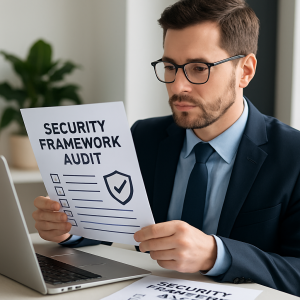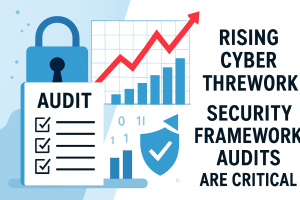In today’s rapidly evolving digital landscape, organizations handle vast amounts of sensitive data—customer information, financial records, intellectual property, and more. With cyber threats becoming more sophisticated, maintaining robust security measures is no longer optional; it’s a necessity. One of the most effective ways to ensure your security posture aligns with industry best practices is through security framework audits.
Why Security Audits Matter
- Ensure Compliance – Meet industry regulations, avoid fines, and maintain certifications.
- 🔍 Identify Gaps – Spot and fix vulnerabilities before attackers exploit them.
- 🤝 Build Trust – Show customers and partners your commitment to data protection.
- 📈 Support Growth – Win new contracts that require certified security measures.
Ensure Compliance
Stay aligned with industry regulations and contractual requirements, avoiding costly fines and reputational damage.
Identify Security Gaps
Detect weaknesses before attackers exploit them and take corrective action proactively.
Build Customer Trust
Demonstrating adherence to security standards reassures clients that their data is safe with you.
Enable Business Growth
Security certifications and compliance often serve as prerequisites for enterprise contracts and strategic partnerships.
Question Regarding Security?
Key Components of a Security Framework Audit
Documentation Review
Assess policies, procedures, and guidelines for alignment with the chosen framework.
Technical Assessment
Scan networks, infrastructure, and applications for vulnerabilities.
Access Control Evaluation
Verify authentication, authorization, and user permission policies.
Incident Response Plan Check
Ensure a tested plan is in place to respond to and contain security incidents.
Risk Assessment
Identify threats and evaluate the organization’s ability to mitigate them.
Reporting & Recommendations
Deliver actionable insights and prioritized steps to close gaps.
Best Practices for Security Framework Audits
- Choose the Right Framework – Select standards (e.g., ISO 27001, NIST, CIS Controls) based on industry and regulatory needs.
- Engage Certified Auditors – Leverage experienced professionals for credibility and accuracy.
- Audit Regularly – Conduct annual audits or after major infrastructure changes.
- Promote Employee Awareness – Train staff on compliance and security responsibilities.
- Use Automation Tools – Speed up vulnerability detection and improve audit accuracy.

Common Challenges (and How to Overcome Them)
- Complex Frameworks – Break down compliance into manageable phases.
- Limited Resources – Allocate dedicated budgets and skilled staff to audits.
- Resistance to Change – Educate stakeholders on the risks of non-compliance and the value of strong security.

Introduction: What Are Security Framework Audits?
Security framework audits are structured evaluations that measure an organization’s compliance with industry-recognized security standards. These audits ensure that security policies, procedures, and systems are robust enough to defend against cyber threats and meet regulatory requirements.
Benefits of Regular Security Audits
✔ Compliance Assurance – Avoid fines and meet regulatory standards. ✔ Risk Reduction – Uncover vulnerabilities before they are exploited. ✔ Customer Trust – Demonstrate commitment to protecting sensitive data. ✔ Process Improvement – Strengthen and streamline your security protocols.
Why They’re Critical
Cybersecurity breaches can cost businesses millions in damages and lost trust. Regular security framework audits not only identify and resolve weaknesses but also validate that your organization meets global security standards such as ISO 27001, NIST, and CIS Controls. This proactive approach safeguards your reputation, enhances resilience, and ensures business continuity.
